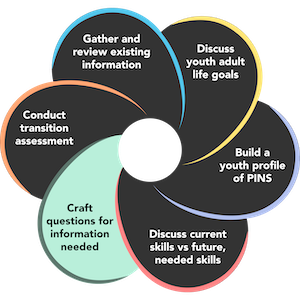What else might the Team need to know?
What types of questions should be explored?
The types of questions that may surface include those that seek to know more about:
- The nature, extent and quality of the youth’s skills
- The depth and extent of the youth’s subject knowledge
- Employment and community engagement possibilities that may exist by using the youth’s interests
- Services to address areas of need and build skills to close the gap
- The youth’s adult life goals - what are the needed skills, wage potential, and job demand
- Connections and eligibility for additional service and support
- The youth’s motivation and interests
New information can:
- Open up discussion of new possibilities
- Impact the direction of adult life goals
- Refine the definition of the adult life goals
- Identify needed adjustments to the transition services
- Validate current goals and action steps
The nature of Transition Assessment is ongoing and a bit like ‘peeling an onion’ – answering the first set of questions leads to the next, deeper layer of questions. Using tools and methods to gather the targeted information can prevent spending time and resources on assessment tools and methods that will not provide information useful to planning for that youth’s transition. Instead new questions are posed that assessment data can address. Selection of tools is addressed in the final Question 5.
Identification of the important transition assessment questions for a youth then focuses the transition assessment plan. The plan becomes a more time and resource efficient process and the resulting information is more individualized and useful for transition planning.
